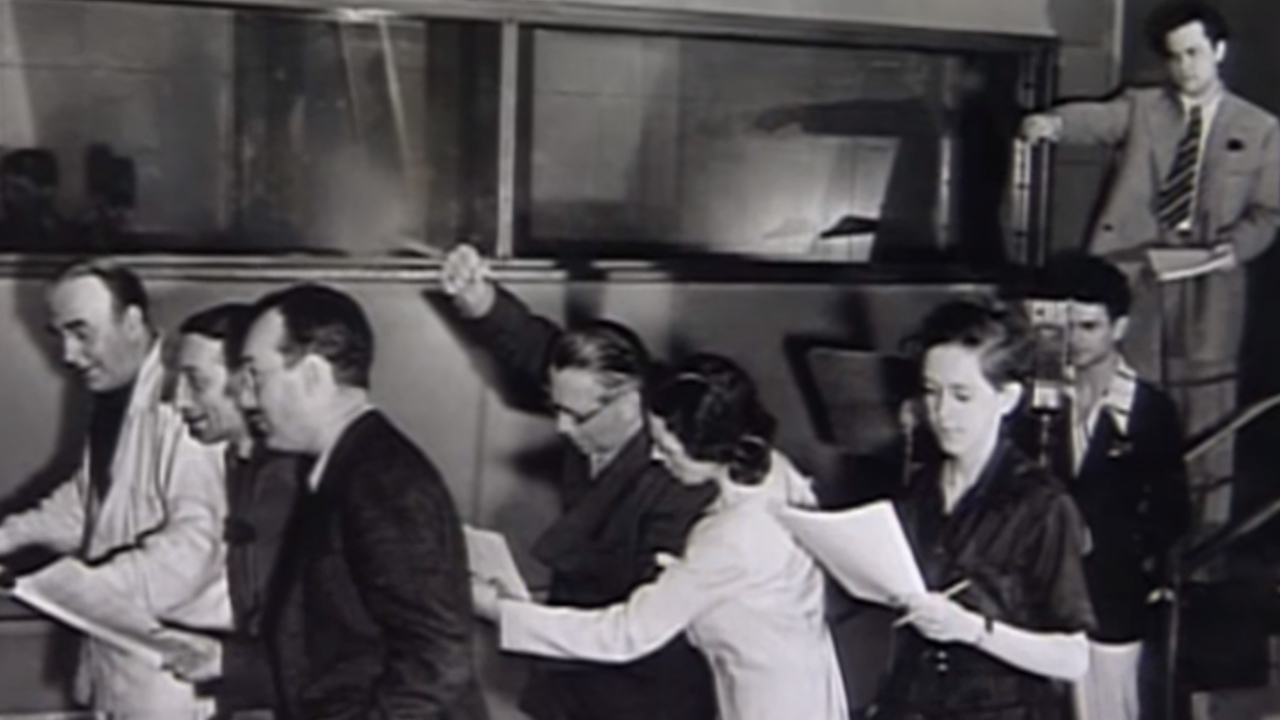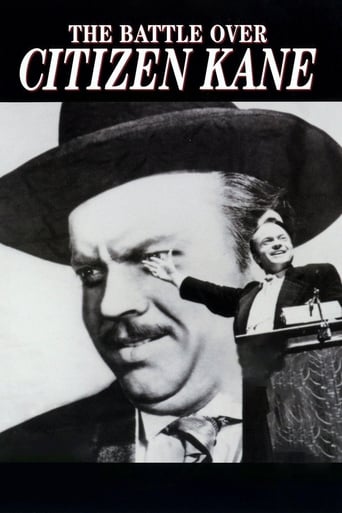


I like the storyline of this show,it attract me so much
... View MorePlot so thin, it passes unnoticed.
... View MoreIf the ambition is to provide two hours of instantly forgettable, popcorn-munching escapism, it succeeds.
... View Moreif their story seems completely bonkers, almost like a feverish work of fiction, you ain't heard nothing yet.
... View MoreBoth William Randolph Hearst and his nemesis, Orson Welles, wind up as tragic figures. This is a PBS presentation, an episode in "The American Experience," which in his later years Hearst would have abhorred.It's paid for by taxes, and Hearst is seen coming up with a very modernistic rant about Roosevelt and HIS tax program -- "impudent...and, yes, revolutionary." You can read the same uncrafted expressions of anger on today's newsboards, like Newsvine.Both men were ahead of their time. Hearst, beginning as a benign humanist, turns out to be Scrooge once he gets terribly rich. (His estate at San Simeon is half the size of Rhode Island.) Those baby boomers, once revolutionaries who tried levitating the Pentagon during the Vietnam years, now tearing their remaining hairs out over the national debt, must know exactly the trajectory of Hearst's evolution from iconoclast to skinflint.Welles doesn't fare much better. He's always lunging ahead, against the odds. Sometimes he wins -- that "War of the Worlds" broadcast, which was very good indeed. And sometimes he loses. In his later life he did nothing BUT lose.An obese Welles died at 69. Hearst lived well into his 80s. Rockefeller lived into his 90s. It may be true, as F. Scott Fitzgerald said, "The very rich are different from you and me." Fitzgerald died in his 40s in a modest Los Angeles apartment.
... View MoreHere is a special kind of documentary. It's surprising that it got nominated for an Oscar for best documentary, as it is from what I've seen in the DVD as being a made-for-TV affair (provided by annual financial support from "Viewers like you"). But on those standards it's one of the best from the 90's. Here is a study, not too long and not too short, about not only the history behind the feud that ensued between William Randolph Hearst and Orson Welles, but really about the two men themselves and how the best thing to come out of it all was the film. As it stands with history in present times, the real facts are interesting enough, yet is more for a selective audience who'll take the time to read books on the subject(s) or watch the documentaries. And if a fictional narrative on celluloid comes out, that may (or may not) become a basis for how that history is seen in the following generations who've never heard of the real stories. Citizen Kane is not a down-to-the-line biographical take on Hearst's jump to fame and his descent into his 'kingdom' of sorts, and it shouldn't have been (although, and this documentary confirms it, certain explicit details were taken from Hearst's life, which even Welles in interviews considers "dirty tricks").So like all good PBS-style documentaries, the filmmakers aren't content with merely showing the making of Kane and the battle over it (there's the dramatization- RKO 281- for that). It goes into the details of the two subjects lives, and an almost compare/contrast format of their claims to fame and power, however gargantuan &/or precious it was. Hearst grew up in what one of the interviewees calls a "19th century mind-set", where what he had was all his, no matter how he got it. It's of true fascination for someone from the end of the 20th century into the 21st century to see the brilliance behind the hubris; Hearst did in fact create the first sort of magazine that today is considered like an Enquirer or a Star magazine, only juicier and fresher to a sensitized audience. He creates an empire, tries to run for Government and fails, and then focuses all of his attentions on Marion Davies, a comic actress whom he nearly moved buildings for.His story is inter-cut wonderfully with Orson Welles's rise to fame. Anyone who knows just a little about Welles knows the hallmark War of the Worlds broadcast which, coincidentally like Hearst, capitalized on the public's pre-World War judgments. But un-like Hearst, who was painted as courteous, but also domineering and God-like (and Welles could be both of those things), Welles's control could get fierce, and difficult, but always for the results on stage or on the radio. Welles came almost 'out of nowhere', and says himself that he rarely heard a discouraging word. That is, until he reached New York, where he became one of the first celebrities to get a hotbed of controversy laid on his daring in entertainment and off. He revolutionized the theater (Macbeth and King Lear are mentioned, but wisely also the reverse power of the flops for Welles), and then radio, and got the most delicious film contract since Charlie Chaplin. When he hooked up with writer and Hearst's San Simian frequenter Herman Manciewicz, the ball got rolling on his first Hollywood picture.For some, this is where the real interest may kick in (likely more for film buffs than regular history aficionados), as Hearst threatened everything but a gun to the studio's executives to squash the film that alluded to so much about his personal life (one doesn't even need to mention 'Rosebud'). Although this part of the film seems to go by a little faster than the bulk of the film, it's of not flaw. Because of the time spent analyzing these two unique mavericks in their fields, one can see almost why this had to happen. It was just as personal and important for Hearst to create his empire as it was for Welles to make his film. There were, of course, many things that were Welles, not Hearst, in the picture, and that adds to its appeal. The film is also excellent as it doesn't shy from pointing out as much as what went wrong as went right; Welles's career would never be the same after that film, and Hearst was already on his way down after the battle was over (one person remarked to Welles after the movie opened up "quit now, quite while you're ahead). It should prove a great viewing for 'Kane' and Welles fans, and those who have not much an interest in him may still have that PBS doc bug going for the Hearst parts of the story.
... View More-Maybe Spoilers herein-This film is a documentary about the conflict Between Orson Welles & William Randolph Hearst over the movie "Citizen Kane." There are interviews with many of the people involved with the film. Hearst was a powerful newspaper publisher who sensationalized the news. Many of the stories in his papers were made up. Welles was a radio and theatrical producer who also loved sensationalism. His plays & radio programs were like nothing else seen at the time. His "War of the worlds" broadcast scared the living daylights out of people since it sounded so real. Both men had at least one characteristic in common: They both believed that the ends justify the means. This is how they became successful and how in the end-destroyed themselves and each other.I have two thoughts regarding this battle: 1. I believe that if Hearst wouldn't have raised a racket over the film, The movie would have been destroyed. Because, People would not believe that Hearst was the kind of man Welles portrays. However, since he did raise a racket people wondered if the events depicted in "Citizen Kane" are true. Otherwise, he wouldn't have raised a racket. 2. These two men were their own worst enemies. There lifestyles and The way they conducted business would eventually come back to haunt them and it did. If you fly too high too soon, you will crash-what goes up MUST COME DOWN! The film "Citizen Kane" set these two on a collision course-they did 15 rounds in the ring and killed each other in the process.Both the newspaper and film industries can learn many lessons.1. The newspaper industry: Never let one man have that much control. There must be accountability here-It is irresponsible to make up stories about living people. In many cases(As he did with Orson Welles)if he didn't like you it was not pretty. This is not what the founding fathers had in mind when they gave us freedom of the press.2. The film industry: Never EVER give complete control to one man. While Welles made a brilliant film, it was about a real living person. Regardless how one feels about Hearst, the fact is it is irresponsible to portray him the way he did in the film.In short-another way of saying this for both: NEVER LET THE IMMATES RUN THE ASSYUM!!The only winner in this battle is the film itself. Perhaps Welles could have at least a little consolation over the fact-that this film is now considered one of the greatest films of all time. And in this day of the DVD format-this film will be forever Preserved. Thank God for that!
... View MoreFeature length documentary on the life of Orson Welles and William Randolph Hearst. The making of the film Citizen Kane, the controversy it had, and the battle between Hearst and Welles, with Hearst trying his best to make sure the film never was released. Very Interesting, never dull, and with some bits of trivia about the movie that isn't that well known. *** out of ****
... View More